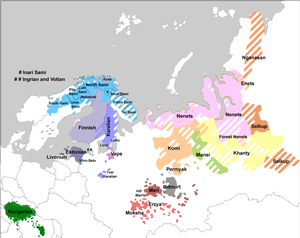Seto dialect
Appearance
| Seto | |
|---|---|
| seto kiil´ | |
| Native to | Estonia |
| Region | Southern Estonia |
| Ethnicity | Setos |
Native speakers | 13,000 (2011 census)[1] |
| Language codes | |
| ISO 639-3 | – |
| Glottolog | seto1241 |


Seto (seto kiil´;[2] Estonian: setu keel) is a dialect of the South Estonian or Võro language (although the Setos generally do not identify as Võro speakers), spoken by 12,549[1] people. It is sometimes considered as a language. The speakers, Seto people, mostly inhabit the area near Estonia's southeastern border with Russia, in the county of Setomaa.
Language sample
Article 1 of the Universal Declaration of Human Rights:
- Seto: Kõik inemiseq sünnüseq avvo ja õiguisi poolõst ütesugumaidsist. Näile om annõt mudsu ja süämetun'stus ja nä piät ütstõõsõga vele muudu läbi kjauma.
- Võro: Kõik inemiseq sünnüseq avvo ja õiguisi poolõst ütesugumaidsis. Näile om annõt mudsu ja süämetunnistus ja nä piät ütstõõsõga vele muudu läbi käümä.
- Estonian: Kõik inimesed sünnivad vabadena ja võrdsetena oma väärikuselt ja õigustelt. Neile on antud mõistus ja südametunnistus ja nende suhtumist üksteisesse peab kandma vendluse vaim.
- Finnish: Kaikki ihmiset syntyvät vapaina ja tasavertaisina arvoltaan ja oikeuksiltaan. Heille on annettu järki ja omatunto, ja heidän on toimittava toisiaan kohtaan veljeyden hengessä.
- English: All human beings are born free and equal in dignity and rights. They are endowed with reason and conscience and should act towards one another in a spirit of brotherhood.
References
- Eichenbaum, K.; Pajusalu, K. (2001): Setode ja võrokeste keelehoiakutest ja identiteedist. – Keel ja Kirjandus nr 7, lk. 483-489.
- Eller, K. (1999): Võro-Seto language. Võro Instituut'. Võro.

